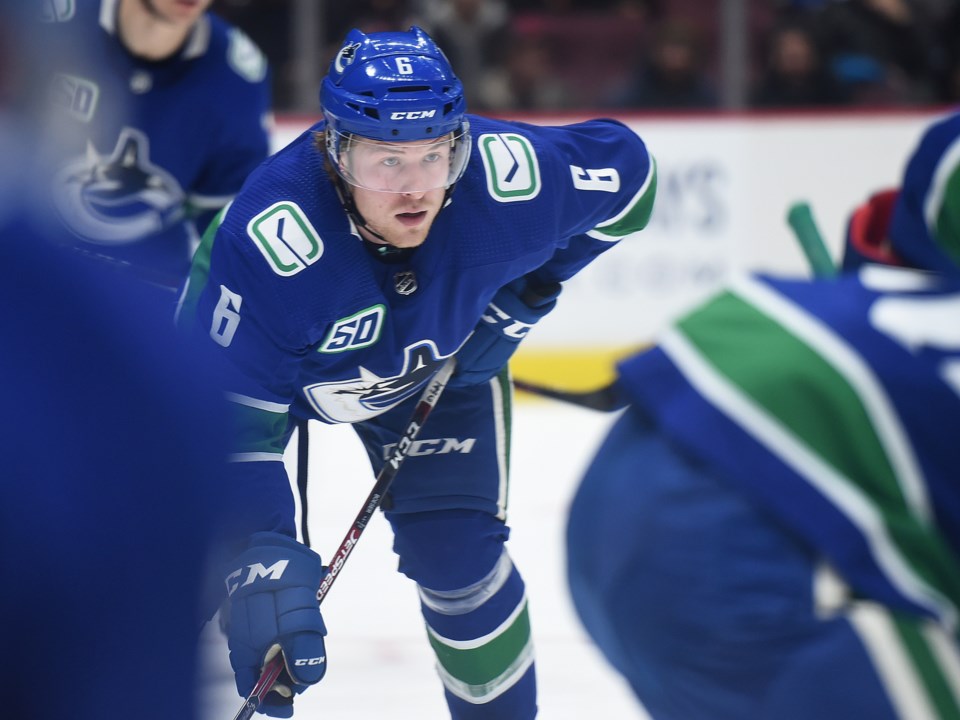You have to feel for the goaltenders in Da Beauty League.
The annual summer hockey tournament in Edina, Minnesota features dozens of NHL players and top-tier players from the AHL and NCAA ranks. Since the aim is just to get on the ice, raise some money for charity, and have some fun without getting hurt, the defensive support for the goaltenders is barely a step up from a casual pond hockey game.
The shots the goaltenders face, however, are anything but casual and the games are high-scoring affairs. That’s great for the fans watching in person and on the league’s livestream, but perhaps not as good for the confidence of the goaltenders, whose save percentages look like they belong in the high-flying 80’s.
Brock Boeser has been tormenting goaltenders in Da Beauty League since 2017. The latest tournament wrapped up last week and Boeser once again dominated. He led Team Bic in scoring with 13 goals and 24 points in 8 games — yes, he averaged three points per game.
Sure, it’s just a “glorified pickup game,” as Philadelphia Flyers defenceman Justin Braun once described it, but it’s still nice to see Boeser ripping one-timers top shelf, particularly in the dog days of summer.
That particular one-timer is especially gratifying to see, as it almost seemed like Boeser had lost the zip on his slap shot a couple of seasons ago. He didn’t score a single goal with a slap shot in 2019-20, when he finished the season with just 16 goals in 57 games.
Staying healthy all season long
The lack of slap shot goals may have had something to do with lingering effects from injuries earlier in his career. Last season, Boeser opened up about how those injuries directly affected his shot.
“My rotation to the left, last year and kind of in the playoffs, it wasn't great,” said Boeser. “It definitely feels freer now and easier to rotate that direction so I think that's really helped a lot.”
You can see in that Da Beauty League one-timer just how much rotation is necessary to unleash that shot. Any tightness in his back would limit his ability to shoot both physically and mentally. When you can’t be confident in your own body, it’s hard to be confident on the ice.
Last season, it was easy to see that Boeser was back and fully confident again.
“Taking care of that area since my first year, I've grown to know what I need to do and if something gets tight, what I need to do to take care of it,” said Boeser. “I definitely have a nice list of things I do before each practice and game to make sure I'm feeling good and stay on top of things, so there's definitely a lot behind the scenes”
That preparation paid off, as Boeser stayed healthy for all 56 games of the season and led the Canucks in scoring with 23 goals and 49 points. That’s a 34-goal, 72-point pace over 82 games, about the same pace he scored at in his rookie season.
It might seem disappointing that Boeser essentially repeated his performance from his rookie year, but getting back to that form after his brutal back injury is an accomplishment in itself. It also came with an improved all-around game and defensive commitment.
Now, finally, Boeser may be ready to take another step forward.
Boeser and Pettersson thrive together
Consider this: the Canucks have never had a fully healthy Brock Boeser and Elias Pettersson together for anywhere near a full season. In Pettersson’s rookie year, Boeser was fresh off his back injury and was limited to 69 games. In 2019-20, Boeser struggled most of the season, by his own admission still adjusting to back issues, then had his season ended by a rib cartilage fracture.
Last season, with Boeser back to full strength and confidence, it was Pettersson whose season ended with a wrist injury that he described as, “like trying to shoot with a knife in my wrist.”
Pettersson reports that he’s back to 100%. Judging by his performance in Da Beauty League, so is Boeser. Can they both stay healthy next season and make some magic together?
While both are excellent players, they undoubtedly make each other better. Over the past three seasons at 5-on-5, both Boeser and Pettersson scored at more than a goal-per-hour pace when they were on the ice together. Boeser averaged 2.38 points per hour with Pettersson, while Pettersson averaged 2.74 points per hour with Boeser.
Apart, Boeser managed just 0.49 goals per hour and 1.56 points per hour. Similarly, Pettersson’s rates dropped to 0.83 goals and 1.99 points per hour — still good, but nowhere near elite. In fact, those are second-line scoring rates.
 Brock Boeser and Elias Pettersson — goals and points at 5-on-5 with and without each other. Data via NaturalStatTrick.com.
Brock Boeser and Elias Pettersson — goals and points at 5-on-5 with and without each other. Data via NaturalStatTrick.com.For the Canucks to thrive, they need both Boeser and Pettersson healthy and spurring each other on.
At 24, Boeser should be in the prime of his career and poised for a breakout performance, particularly in a contract year where he badly wants to prove himself and take the Canucks back to the playoffs. He should be able to reach 30 goals for the first time in his career and has a chance to do even more and take his place among the elite snipers in the game.
If he does, that will go a long way towards making the Canucks a playoff contender.




